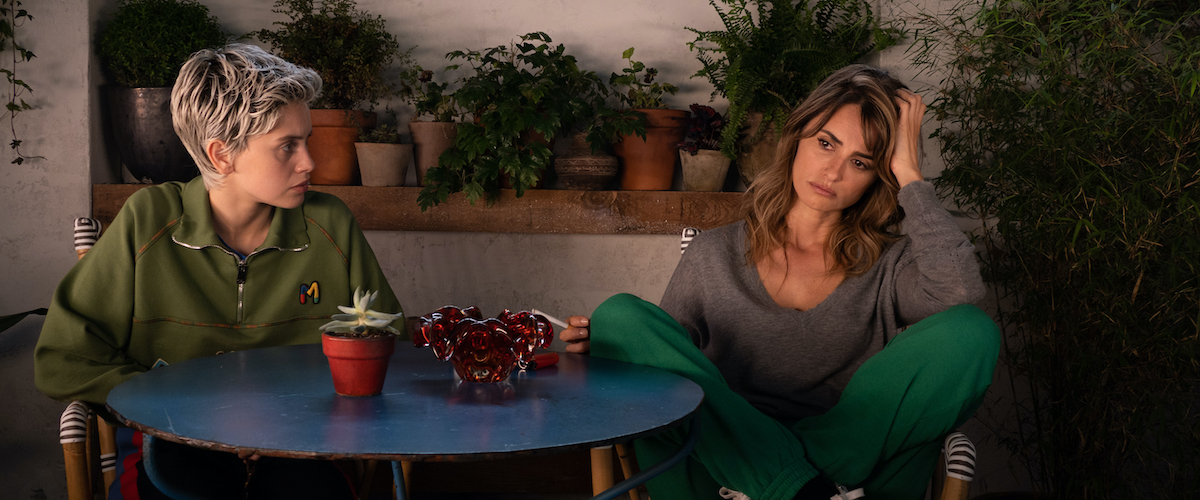
This review contains mild spoilers.
A popular concept today is that of the “family you choose”—the notion that, if your own family is cruel or rejecting in any way, you can consciously select which people you want to build a life with. I love and endorse this concept, but the power of DNA is also undeniable. It’s one of the many reasons why genealogy has become such a popular pastime and why those “You’re NOT the father!” Maury Povich episodes dominated the airwaves for so many years. In some ways, our DNA is our destiny.
In Pedro Almodóvar’s Parallel Mothers, our hero, Janis (Penélope Cruz) has a strong tie to a grandfather she’s never met. He was killed by Franco’s brutal regime and lies in a mass grave, near her childhood village in Spain. As the film starts, Janis, who is a high-end magazine photographer (and dresses in a series of enviable slouchy sweaters), is doing a shoot with an archeologist named Arturo (Israel Elejalde). After the shoot, they go out for a drink and she asks if he would be able to excavate the gravesite, something the village has longed for so they can give their deceased relatives a proper burial. He explains that there’s a process, that such a project needs to be approved by a governing board, it could take years. But he agrees to help her. Meanwhile, the chemistry between them is undeniable. They sleep together and she gets pregnant.
Far from being consternated by this turn of events, Janis is happy. She’s at that age where pregnancy is not expected, or even likely. She sees this baby as a blessing even if Arturo, who is married to a woman with cancer, tries to talk her out of having it. She’s content to raise the baby alone.
At the hospital, Janis meets a pregnant teenager named Ana (Milena Smit) who is in a very different circumstance. Her mother (Aitana Sánchez-Gijón) is a busy actress who breezes into the hospital room, seemingly uninterested and slightly put off by her daughter’s pregnancy. Ana’s father, we learn, foisted her upon her mother when he found out his daughter was pregnant. So there’s a lot of shame attached to the birth of this child. (We later discover the circumstances of Ana’s pregnancy, making her parent’s behavior all the more horrible.)
Janis immediately takes Ana under her wing. We can see, right away, that Janis will be an excellent mother. She has a natural warmth and nurturing spirit that Ana is drawn to. Their babies are born within hours of each other, and they agree to stay in touch.
When Arturo meets his new daughter, however, he is repelled. He feels no blood connection to the child, he insists the child looks like neither himself nor Janis. But Janis claims the baby looks like her great uncle. She is so furious with Arturo’s reaction, they break up.
Meanwhile, Janis continues with her life. She raises her baby, happily. She fires her iPhone-distracted nanny—and then coincidentally bumps into Ana, who has moved out of her mother’s house and is now working at a café. (She has also cut her hair and dyed it a punkish bleach blonde.) Janis asks Ana to serve as her nanny/housekeeper and Ana agrees. The two women become closer.
Ana and Janis are, of course, the parallel mothers of the film’s title, but that manifests in different ways. Ana and Janis are both mothers of baby girls themselves. And Janis becomes a mother figure of sorts to Ana—and then much more. When she first invites her up to her flat, Janis teaches Ana how to properly make a Spanish potato omelet, peeling the potatoes just so, immersing them in oil in a large skillet. It’s done with precision and love, like the passing down of a family recipe. Both actresses are wonderful here and Cruz, in particular, continues to bring out the best in Almodóvar—and vice versa.
The domestic bliss that Janis and Ana create is disrupted when Arturo returns, telling Janis that the excavation project is going forward.
There are more twists and turns in Parallel Mothers that I won’t disclose but the film is mesmerizing. We are bound by our past, by personal and shared tragedy, Almodóvar makes clear, but also by the new connections we forge, the ancestral lore we share, and yes—by the families we choose.
Parallel Mothers opens this Friday at the Charles.
